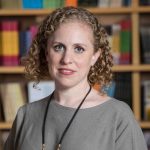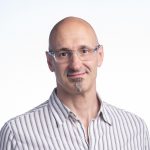
- This event has passed.
7th European P4 Workshop (EuroP4’24)

Sponsored by AMD
![]()
The 7th edition of EuroP4 was held on October 28th in conjunction with the 32nd IEEE International Conference on Network Protocols (ICNP 2024), in Charleroi, Belgium.
EuroP4’24 brings together networking researchers and practitioners to discuss cutting-edge, P4-enabled research and P4-based technology. The workshop provides a venue for presenting and discussing research and projects related to P4, as well as for more broadly discussing the needs of this research community. The workshop aims to forge new connections between researchers who already work with P4, introduce more networking researchers to the P4 community, and seed future top-tier publications, innovation and contributions to this community.
Keynotes
 Shir Landau Feibish, Senior Lecturer (Assistant Professor)
Shir Landau Feibish, Senior Lecturer (Assistant Professor)
Department of Mathematics and Computer Science, Open University of Israel
Shir is a Senior Lecturer (Assistant Professor) and head of the RUNS lab at The Open University of Israel. Before joining The Open University, Shir was a postdoctoral researcher at Princeton University.
Shir’s main interests are network telemetry and programmable networks. Her work focuses on building tools for network monitoring by tailoring streaming methods and compact data structures to the computational model and constraints of programmable devices. Shir has received several awards including the Eric and Wendy Schmidt Postdoctoral Award for Women in Mathematical and Computing Sciences and was named one of the Rising Stars in Networking and Communications of 2020 by the N2Women Organization.
“Time-Aware Network Telemetry in the Data Plane”
Abstract: Collecting network telemetry is essential for detecting problems in the network. In recent years we have seen an abundance of research on network telemetry in the data plane. Many of these solutions analyze traffic continuously over a long period of time, while resetting the structure from time to time. If shorter time intervals are needed, sliding windows are usually used, yet these incur significant resource and management overhead. However, often in order to understand what is happening in the network we need to measure events that have recently happened.
We explore the concept of time-aware network telemetry and propose several different paradigms that we utilize for various telemetry tasks. The first is a reactive monitoring scheme for packet loss detection, that monitors only when needed, by tailoring the measurement interval to when losses may occur. The second is a mechanism for finding heavy hitter flows of the recent past. Finally, we explore the option of deleting and decaying a set-membership data structure to allow for more updated information to be maintained.

Mario Baldi, Fellow
AMD Research and Advanced Development
Mario Baldi is a Fellow at AMD, Research and Advanced Development, and Associate Professor of Information Processing Systems (currently on leave) at Politecnico di Torino (Technical University of Turin), Italy. He has held various positions in startup and established companies in the computer networking industry, as well as several visiting professorships at Universities in four continents, during over 25 years of professional involvement in the computer networking domain. He authored over 150 scholarly papers on various networking related topics and two books, and is co-inventor in 35 patents.
“SmartNICs – P4’s Final Latest Frontier – Challenges and Opportunities Ahead”
Abstract: While P4 emerged and got established as a language to program packet processing in switches, it has since been successfully adopted in the context of programmable SmartNICs . This talk first overviews the widely differing architectures of programmable SmartNICs currently available on the market and then discusses the challenges we encounter when deploying P4 for programming them, as well as the opportunities ahead.
Agenda
Mario Baldi, Fellow, AMD Research and Advanced Development
Slides
Lars-Christian Schulz, Robin Wehner, David Hausheer (OVGU Magdeburg, Germany)
Martim Francisco, Bernardo Ferreira, Fernando M. V. Ramos (University of Lisbon, Portugal), Eduard Marin (Telefonica Research, Spain), Salvatore Signorello (Telefonica Research, Spain; University of Lisbon, Portugal)
Mariano Scazzariello (KTH Royal Institute of Technology, Sweden), Tommaso Caiazzi (Roma Tre University ,Italy), Marco Chiesa (KTH Royal Institute of Technology, Sweden)
Shir Landau Feibish, Assistant Professor, Open University of Israel
Robin Wehner, Tony John, Lars-Christian Schulz, David Hausheer (OVGU Magdeburg, Germany)
Aristide Tanyi-Jong Akem (IMDEA Networks Institute, Spain; Universidad Carlos III de Madrid, Spain), Marco Fiore (IMDEA Networks Institute, Spain)
WORKSHOP ORGANISERS
General Chairs:
– Fernando Ramos, University of Lisbon
– Muhammad Shahbaz, Purdue University
Program Chairs:
– Amedeo Sapio, Amazon Web Services (AWS)
– Sandor Laki, ELTE Eötvös Loránd University
Publicity Chair:
– Csaba Györgyi, ELTE Eötvös Loránd University / University of Vienna
Program Committee:
– Andreas Kassler (Karlstad University, Sweden; Technische Hochschule Deggendorf, Germany)
– Francesco Paolucci (CNIT, Italy)
– Stefan Schmid (TU Berlin, Germany)
– Christian E. Rothenberg (University of Campinas, Brasil)
– Noa Zilberman (Oxford University, UK)
– Gergely Pongrácz (Ericsson, Hungary)
– Andy Fingerhut (Cisco Systems, USA)
– Nik Sultana (Illinois Institute of Technology, USA)
– Sebastiano Miano (Politecnico di Milano, Italy)
– Sebastian Gallenmüller (TU Munich, Germany)
– Mingyuan Zang (Technical University of Denmark, Denmark)
– Masoud Hemmatpour (The Arctic University of Norway, Norway)
– Alan Zaoxing Liu (University of Maryland, USA)
